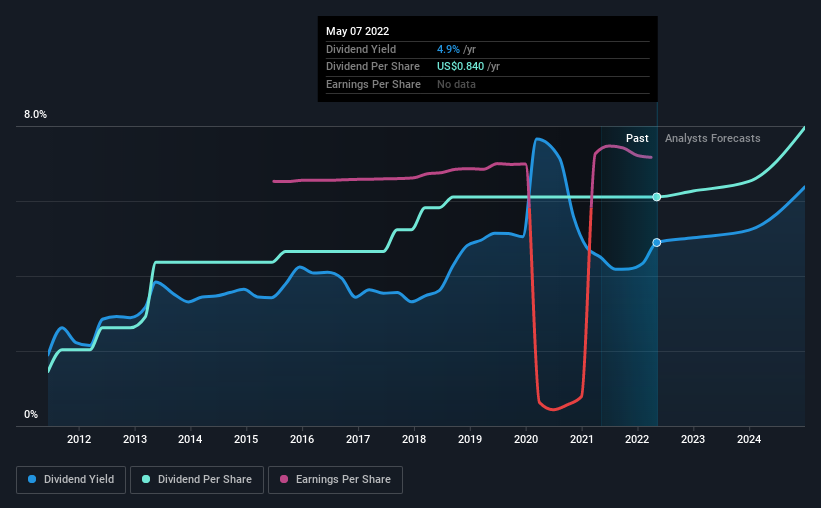
The board of Umpqua Holdings Corporation (NASDAQ:UMPQ) has announced that it will pay a dividend of US$0.21 per share on the 27th of May. Based on this payment, the dividend yield on the company's stock will be 4.9%, which is an attractive boost to shareholder returns.
Check out our latest analysis for Umpqua Holdings
Umpqua Holdings' Dividend Is Well Covered By Earnings
We like to see robust dividend yields, but that doesn't matter if the payment isn't sustainable. Before making this announcement, Umpqua Holdings was easily earning enough to cover the dividend. As a result, a large proportion of what it earned was being reinvested back into the business.
Looking forward, earnings per share is forecast to fall by 26.8% over the next year. Assuming the dividend continues along recent trends, we believe the payout ratio could be 65%, which we are pretty comfortable with and we think is feasible on an earnings basis.

Umpqua Holdings Has A Solid Track Record
The company has been paying a dividend for a long time, and it has been quite stable which gives us confidence in the future dividend potential. The dividend has gone from US$0.20 in 2012 to the most recent annual payment of US$0.84. This implies that the company grew its distributions at a yearly rate of about 15% over that duration. We can see that payments have shown some very nice upward momentum without faltering, which provides some reassurance that future payments will also be reliable.
The Dividend Looks Likely To Grow
The company's investors will be pleased to have been receiving dividend income for some time. Umpqua Holdings has seen EPS rising for the last five years, at 12% per annum. Umpqua Holdings definitely has the potential to grow its dividend in the future with earnings on an uptrend and a low payout ratio.
Umpqua Holdings Looks Like A Great Dividend Stock
Overall, we think that this is a great income investment, and we think that maintaining the dividend this year may have been a conservative choice. The earnings easily cover the company's distributions, and the company is generating plenty of cash. We should point out that the earnings are expected to fall over the next 12 months, which won't be a problem if this doesn't become a trend, but could cause some turbulence in the next year. All of these factors considered, we think this has solid potential as a dividend stock.
Market movements attest to how highly valued a consistent dividend policy is compared to one which is more unpredictable. However, there are other things to consider for investors when analysing stock performance. For example, we've picked out 1 warning sign for Umpqua Holdings that investors should know about before committing capital to this stock. If you are a dividend investor, you might also want to look at our curated list of high yield dividend stocks.
New: AI Stock Screener & Alerts
Our new AI Stock Screener scans the market every day to uncover opportunities.
• Dividend Powerhouses (3%+ Yield)
• Undervalued Small Caps with Insider Buying
• High growth Tech and AI Companies
Or build your own from over 50 metrics.
Have feedback on this article? Concerned about the content? Get in touch with us directly. Alternatively, email editorial-team (at) simplywallst.com.
This article by Simply Wall St is general in nature. We provide commentary based on historical data and analyst forecasts only using an unbiased methodology and our articles are not intended to be financial advice. It does not constitute a recommendation to buy or sell any stock, and does not take account of your objectives, or your financial situation. We aim to bring you long-term focused analysis driven by fundamental data. Note that our analysis may not factor in the latest price-sensitive company announcements or qualitative material. Simply Wall St has no position in any stocks mentioned.
About NasdaqGS:COLB
Columbia Banking System
Operates as the Bank holding company of Umpqua Bank that provides banking, private banking, mortgage, and other financial services in the United States.
Very undervalued with flawless balance sheet and pays a dividend.

